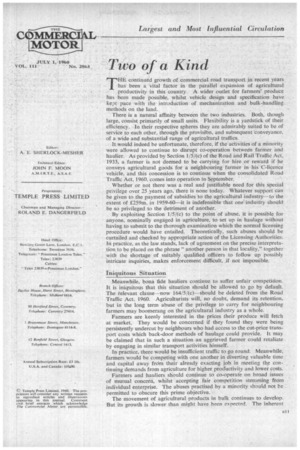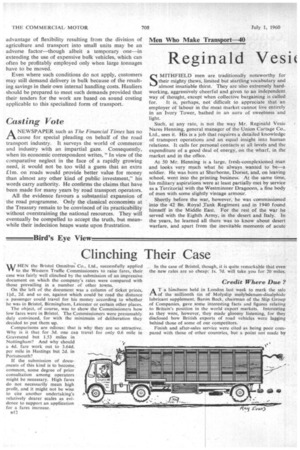Two of a Kind T HE continued growth of commercial road
Page 45

Page 46

If you've noticed an error in this article please click here to report it so we can fix it.
transport„ in recent years has been a vital factor in the parallel expansion of agricultural • productivity in this country. A wider outlet for farmers' produce has been made possible, whilst vehicle design and specification have kept pace with the introduction of mechanization and bulk-handling methods on the land.
There is a natural affinity between the two industries. Both, though large, consist primarily of small units. Flexibility is a yardstick of their efficiency. In their respective spheres they are admirably suited to be of service to each other, through the provisibn, and subsequent conveyance, of a wide and substantial range of agricultural traffics.. It would indeed be unfortunate, therefore, if the activities of a minority were allowed to continue to disrupt co-operation between farther and haulier, As provided by Section 1/5/(c) of the .Road and Rail Traffic Act', 1933, a farmer is not deemed to be carrying for hire or reward if he conveys agricultural goods for a neighbouring farmer in his Glieence vehicle, and this concession is to continue when the consolidated Road Traffic Act, 1960, comes into operation in September: Whether or not there was a real and justifiable need for this special privilege over 25 years ago, there is none today. Whatever support car. be given to the payment of subsidies to the agricultural industry—to the extent of £259m. in 1959-60—it is indefensible that one induStry should be sci privileged to the detriment of another.
By exploiting Section 1/51(c) to the point of abuse, it is possible fm. anyone, nominally engaged in agriculture, to set up in haulage m,,ithout having to submit to the thorough examination which the normal licensing procedure would have entailed. Theoretically, such abuses should be curtailed and checked by appropriate action of the I...icensing Authorities. In practiCe, as the law stands, lack of agreement on the precise interpretation to be placed on the phrase " another person in that locality," together with the shortage of suitably qualified officers to follow up possibly intricate inquiries, makes enforcement difficult, if not impossible.
Iniquitous Situation
Meanwhile, bona fide hauliers continue to suffer unfair competition. It is iniquitous that this situation should be allowed to go by default. The relevant clause --now 164./57(c)—should be deleted from the Road Traffic Act, 1960. Agriculturists win, no doubt, demand its retention, but in the long term abuse of the privilege to carry for neighbouring farmers may boomerang on the agricultural industry as a whole.
Farmers are keenly interested in the prices their produce will fetch at market. They would be concerned if they found they were being persistently undercut by neighbpurs who had access to the cut-price transport costs which back-door methods of haulage could provide. It may be claimed that in such a situation an aggrieved farmer could retaliate by engaging in similar transport activities himself.
• In practice, there would be insufficient traffic to go round. Meanwhile, farmers would be competing with one another in diverting valuable time and capital away frcim their already exacting job in meeting the continuing demands from agriculture for higher productivity and lower costs, Fanners and hauliers should continue to co-operate on broad issues of mutual concern, whilst accepting fair competition stemming from individual enterprise. The abuses practised by a minority should not be permitted to obscure this prime objective.
The movement of agricultural products in bulk continues to develop. But its growth is slower than might have been expected. The inherent advantage of flexibility resulting from the division of agriculture and transport into small units may be an adverse factor—though albeit a temporary one—in extending the use of expensive bulk vehicles, which can often be profitably employed only when large tonnages have to be moved.
Even where such conditions do not apply, customers may still demand delivery in bulk because of the resulting savings in their own internal handling costs. Hauliers should be prepared to meet such demands provided that their tenders for the work are based on sound costing applicable to this specialized form of transport.
Gusting Vote
A NEWSPAPER such as The Financial Times has no cause for special pleading on behalf of the road transport industry. It surveys the world of commerce and industry with an impartial gaze. Consequently, when its economic correspondent writes, In view of the comparative neglect in the face of a rapidly growing need, it would not be too wild a guess that an extra Lim, on roads would provide better value for money than almost any other kind of public investment," his words carry authority. He confirms the claims that have been made for many years by road transport operators. All the evidence favours a substantial expansion of the road programme. Only the classical economists at the Treasury remain to be convinced of its practicability without overstraining the national resources. They will eventually be compelled to accept the truth, but meanwhile their indecision heaps waste upon frustration.




























































































































































